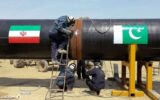Pakistan wants Iranian gas

According to Energy Press, Ebrahim Raisi is the first president of Iran to visit Pakistan since 2017. In a joint statement published during Dr. Raisi’s visit to Pakistan last week, the two countries emphasized the importance of cooperation in the field of energy, electricity trade, power transmission lines and the IP gas pipeline project, also known as the Peace Pipeline. . In recent months, Pakistan’s gas pipeline project with Iran has been at the center of attention and various media analyzes and the comments of political officials of Pakistan and Iran as well as the United States.
Pakistan and energy crisis
Pakistan and other developing countries have experienced multiple crises since the start of the Covid pandemic. A mixture of financial, social and energy issues has put this country in a dangerous situation. The increase in global demand for liquefied natural gas (LNG) and the sharp growth in gas prices, especially after the European energy crisis in 2022, made the situation much more difficult for Pakistan.
The global economic conditions are not favorable for a country like Pakistan, which is already struggling with a declining economy and lack of power infrastructure. Pakistan’s consumers and industries rely heavily on natural gas for heating and energy, and the country is in an acute situation that necessitates the supply of cheap gas.
In order to reduce the cost of energy imports, Islamabad even negotiated with Russia, which is under Western sanctions following the Ukraine war and is looking for a customer in the East with its discounted oil and gas supply. But it faces many diplomatic and technical challenges to implement such a program.
Natural gas constitutes about 40% of the country’s energy portfolio. Pakistan also imports about 80% of its oil needs. In such a situation, Iran, which, according to the British Petroleum Company’s statistical analysis of global energy, has the second largest gas reserves in the world after Russia and is located in Pakistan’s neighborhood, is considered a favorable option for meeting Islamabad’s energy needs.
Pakistan’s government, which does not have much foreign exchange reserves to cover imports for a long time, is desperately trying to manage the balance of payments crisis and control inflation. In this regard, the Ministry of Commerce of Pakistan announced last year that the government has issued a special order for the clearing trade of some goods, including oil and natural gas, with Afghanistan, Iran and Russia. At that time, Sajid Amin, deputy director of the Sustainable Development Policy Institute, said: Pakistan can benefit from importing oil and energy from Russia and Iran without adding to the dollar demand.
10-year wait for the construction of the peace pipeline
In the midst of Pakistan’s urgent need for energy and also the request from the United States to issue a sanction exemption for the gas pipeline, the interim government of Pakistan agreed to the plans to start the construction of the 80 km section of this project in February last year.
Pakistan approved the construction of an 80-kilometer pipeline from its border with Iran to the port city of Gwadar in the southwest of the country. The decision coincided with a deadline set by Iran under a 2009 accord for Pakistan to begin construction of the pipeline or face international legal action.
The Pakistani press reported that the construction of the approved pipeline would allow the country to save more than five billion dollars annually on gas imports. The construction cost of this pipeline, which extends from the border line of Iran to the city of Bandar Gwadar in Balochistan province, is estimated at 45 billion Pakistani rupees.
Under the initial agreement, it was decided to build a 1,931-kilometer pipeline to transfer Iran’s gas to Pakistan, which includes 1,150 kilometers of pipelines inside Iran and 781 kilometers of pipelines inside Pakistan. Both countries were required to implement this project on their soil. According to the agreement, the supply of this project was supposed to start by January 2015. Currently, Iran has completed the construction of more than 900 km of this pipeline within its territory, while the remaining 250 km section has not yet been built.
The key to the gas pipeline project was struck in 2010 with the aim of transferring gas from South Pars fields in Iran to supply energy to Pakistan; A project that, despite being completed in Iran, has been delayed in Pakistan. According to the gas purchase and sale agreement signed in June 2009, Iran was determined to export 750 million to 1 billion cubic feet (maximum 28.3 million cubic meters) of natural gas to Pakistan per day. But despite the completion of the construction of a 900 km pipeline by Iran in 2011, this project has been stopped.
An informed source told the Pakistani Nation news website: If Pakistan does not implement this project, Tehran will refer the case to the International Court of Arbitration based in Paris, and it is estimated that Pakistan will pay about $18 billion in contractual obligations.
- Comments sent by you will be published after approval by site administrators.
- Comments that contain slander will not be published.
- Comments that are not in Persian or not related to the news will not be published.

Comments
Total comments : 0 Awaiting review : 0 Date: 0